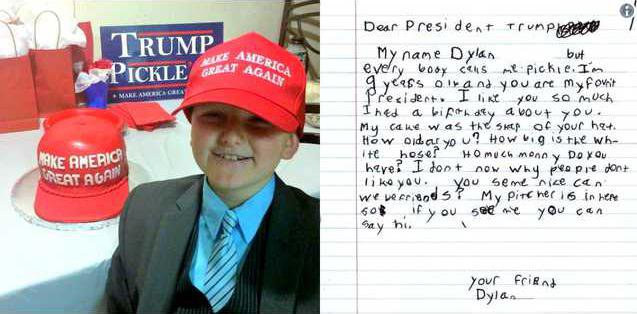A 9-year-old boy who made national headlines last month with his letter to President Donald Trump has had trouble finding someone to make a pro-Trump cake.
As Fox News reported in July, White House press secretary Sarah Huckabee Sanders read a letter sent from a boy named Dylan, who explained why Trump was his favorite president.
The boys name wasnt included, except for the fact that people call him Pickle.
Im 9 years old and you are my favrit president. I like you so much I had a birthday about you. My cake was the shap of your hat, the letter read.
But skeptics didnt believe the boy existed. Through research into the boys family, The Washington Post found that the boy was Dylan Harbin of California.
Pickle said he, too, wants to be president and hopes Trump is around to see it.
Do you think Donald Trump will live to be 100? Dylan asked his mom. Because then he can watch me be president.
Dylan said he spent nearly a month deciding whether or not to send the letter to the president.
He told the Fox News program Fox and Friends that he wrote the letter so he could become friends with Trump.
Since the press briefing aired, hes watched his letter read aloud at least five or six times, according to The Washington Post.
But it hasnt been all great. Dylan couldnt find anyone to make him a pro-Donald Trump cake.
So instead, his mom made him one herself, because she couldnt find a bakery willing and able to do it, according to The Washington Post.
His mom also told The Washington Post that people have been mocking the letter.
Honestly, I thought, how can adults be so mean about a 9-year-old boy? she asked.
As Fox News reported in July, White House press secretary Sarah Huckabee Sanders read a letter sent from a boy named Dylan, who explained why Trump was his favorite president.
The boys name wasnt included, except for the fact that people call him Pickle.
Im 9 years old and you are my favrit president. I like you so much I had a birthday about you. My cake was the shap of your hat, the letter read.
But skeptics didnt believe the boy existed. Through research into the boys family, The Washington Post found that the boy was Dylan Harbin of California.
Pickle said he, too, wants to be president and hopes Trump is around to see it.
Do you think Donald Trump will live to be 100? Dylan asked his mom. Because then he can watch me be president.
Dylan said he spent nearly a month deciding whether or not to send the letter to the president.
He told the Fox News program Fox and Friends that he wrote the letter so he could become friends with Trump.
Since the press briefing aired, hes watched his letter read aloud at least five or six times, according to The Washington Post.
But it hasnt been all great. Dylan couldnt find anyone to make him a pro-Donald Trump cake.
So instead, his mom made him one herself, because she couldnt find a bakery willing and able to do it, according to The Washington Post.
His mom also told The Washington Post that people have been mocking the letter.
Honestly, I thought, how can adults be so mean about a 9-year-old boy? she asked.








